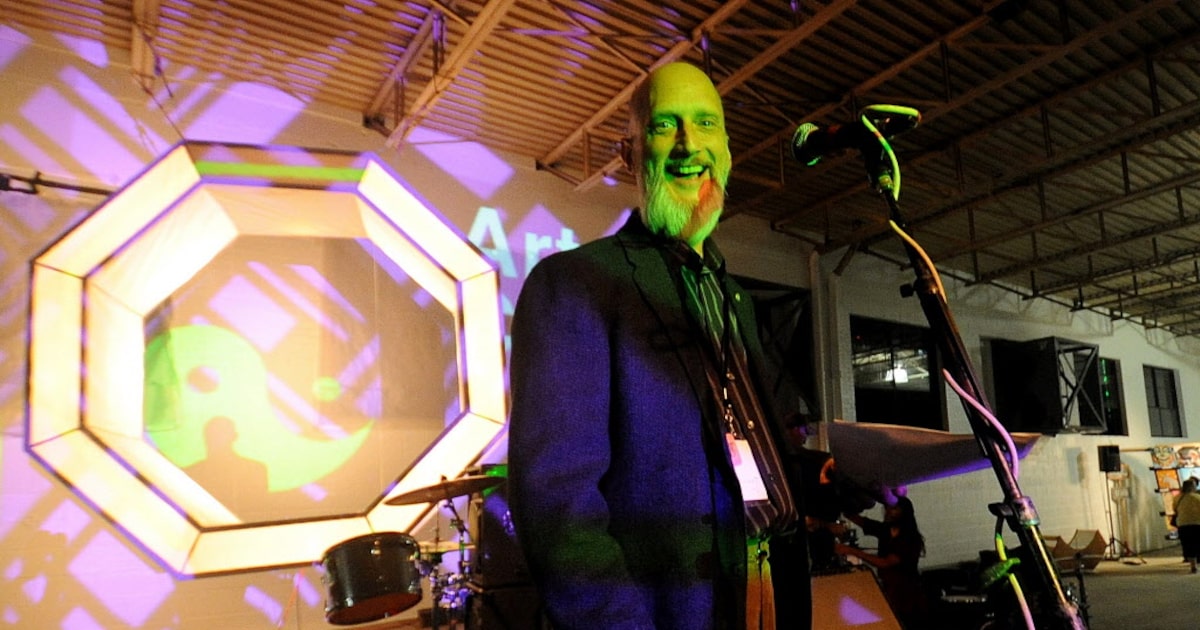
Music generated by artificial intelligence is spreading rapidly, but it remains taboo among aficionados and artists, as Paul Slavens found out recently when he tried to host a forum on the subject in Denton.
If you don’t know Slavens’ music, think of him as the human, musical ChatGPT. Long before you could download anything from OpenAI, Slavens was doing a weekly gig at Dan’s Silver Leaf, crowdsourcing prompts for songs and instantaneously composing complex, comical tunes based on those prompts. I heard one of these performances, and could not believe how, with nothing but a keyboard and bare-bones backing band, he pulled off a note-perfect Meatloaf power ballad parody from the prompt “peanut butter stuck to the top of your mouth.” The chorus sounded like Meatloaf trying to sing with a mouthful of meatloaf.
This gift for improvisation has landed Slavens some interesting gigs, such as playing the soundtrack to silent movies at the Modern Art Museum of Fort Worth and a fundraiser at “a fancy-pants golf course” he told me about where he had to musically heckle golfers near a water hazard.
Slavens’ brain “works the exact same way” he understands generative AI to work, he told me. Instantaneous pastiche — essentially extended riffs on existing artistic products — is AI’s principal creative offering.
In the field of music, generative AI is still a dirty word. French music-streaming service Deezer recently installed an AI detector and found almost three out of every 10 tracks made available to its service were generated by AI. Deezer promises to exclude AI tracks from algorithmic recommendations due to concerns about copyright infringement, royalties and fakery.
Opinion
Slavens, longtime host of a weekly radio show on KXT-FM (91.7), shares some of Deezer’s concerns about AI risks, but he believes it’s futile to try to protect music from technology once you put it out in the world. His take is the same one a tech entrepreneur in Denton put to me the other day: “You may not like it, but it’s coming.”
“I think there’s two big camps,” said Slavens. “There’s ‘I hate AI, I hate everything AI does, and AI is terrible and anyone who is for it is horrible,’ and then there’s everybody else, all the way from full adopting to ‘I like it for some things’ or whatever. … It’s technology: It’s going to have all the same things that technology has, … good things and bad things.”
Dentonites responded with fury when Rubber Gloves Rehearsal Studios, the town’s answer to Austin’s Emo club, scheduled an AI music forum this summer, featuring Slavens. In its Aug. 14 apology, the venue posted on Facebook: “The club has been and will continue to be an A.I. free zone. We are sorry about this glitch in the Matrix.”
Slavens keeps trying. On Sept 25, he co-hosted a performance in Dallas with Fort Worth technologist and artist James Talambas.
As with many taboos, Slavens has discovered AI is not as scary when approached with an open mind. In fact, the main thing that stuck him about collaborating with machines was how fun it turned out to be.
This is a rare sentiment in the music industry. Drake and other major stars have railed against the use of AI versions of themselves. Grimes, Elon Musk’s ex-partner, is one of the only musicians to say she doesn’t mind AI mimicking her. Will.i.am is one of the few who have admitted to playing around with the technology in the studio.
Play is the operative word. Slavens said his experiments with AI supercharged his imaginative energies. Making tracks by playing with his own idea and AI prompts felt like a return to the boundless make-believe of his childhood. This was what he thought being a musician would be like when he was a kid.
The experiments followed a fallow period for Slavens. It took him three years to cut his last album, Alphabet Girls, Vol. II. He dropped it in 2022 and “nobody cared,” he said. He estimates this masterwork was streamed seven times. He all but quit recording his compositions.
Until, that is, a recent trip to Hawaii. A musician buddy there had been sending Slavens some of the AI tracks he had produced, using ChatGPT prompts to write the lyrics.
Slavens was astounded by the depth and quality of the songs. He would send the music to other players, and nobody could believe how far AI had come so quickly.
“Man, let’s make AI music,’” said his fellow musician when Slavens arrived in Hawaii for a visit.
Slavens realized that, rather than just taking what AI spat out, he could collaborate with a free musical program, feeding it his lyrics and style prompts.
One of the songs he sent me is from a genre Slavens calls “exotica,” the slightly tropical-inflected lounge music popular in the 1950s.
In “Knock Lightly,” Slavens’ pastiche of a sweet 50s love song, a robot woman’s voice reminded me of the slightly husky tones of Doris Day. “She” is clearly not Doris Day, but she sounds just as accomplished, like she must have had a 15-year career in movie musicals, then married her producer, with whom she had 12 children including a future Idaho congressman. Or one imagines.
The she-robot also sings as if English is her second language, rhyming “quietly” with “lightly” in a way that only Marlene Dietrich or Brigitte Bardot could have gotten away with.
The other track Slavens shared is a clever cat-and-mouse concept in which he asks his AI collaborator “which one of us is real?” in a kind of prog-rock style, like Supertramp jamming with Autotune.
Slavens remains conflicted. He is as skeptical as anyone about the net effect of AI for humanity — particularly as it takes jobs from humans. At the Dallas forum, he wants to share the wonder that experimenting with AI made him feel. But he doesn’t want to become a lightning rod for one of the most divisive issues in modern music.
Slavens doesn’t think people will care about his AI compositions any more than they did about his last album. In fact, he expects the proliferation of beautiful music that will eventually arise from AI to result in less music sharing, as people compose music for their own listening pleasure.

